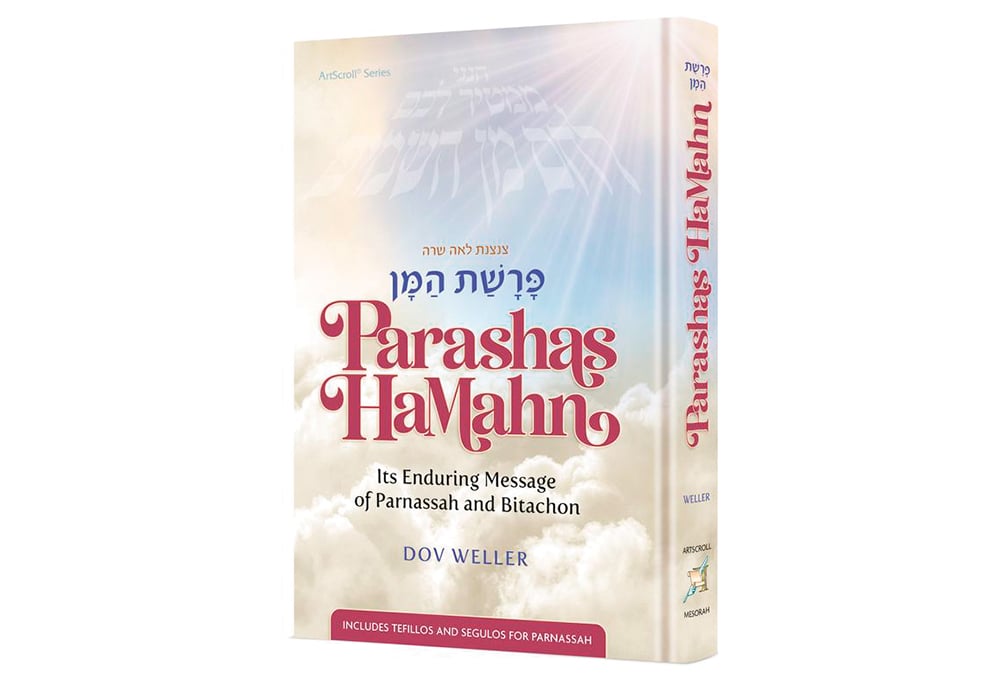
(Courtesy of Artscroll)
Excerpting: “Parashas HaMahn” by Dov Weller. Artscroll. 240 Pages. 2025. ISBN-10: 1422642909.
The Noam Elimelech writes that the miraculous mahn exists today just as it did during the forty years the Jewish nation journeyed through the barren Wilderness. The same channel of berachah that brought the mahn then, exists today in the guise of nature. Hashem is prepared to provide sustenance to everyone, each day. The prosperity is there, waiting to be released. Bitachon in Hashem, internalizing in both thought and action that one’s financial state is directly dependent on Hashem’s flow of goodness, is the key to opening the floodgates of berachah. But when a person is lacking in bitachon and thinks that it is his actions, his education, his hustle, his intelligence, his connections, and his energy that are responsible for his parnassah, he creates a barrier.
Chovos HaLevavos tells us that bitachon is the key to parnassah. Reliance on Hashem not only frees us from the shackles of worry, it is the conduit that connects us directly to the mahn, which was given to us directly from Hashem. Sefer Rav Ye’ivi writes succinctly, “Parnassah is the result of bitachon. The more bitachon the more parnassah, as the verse states, ‘Hashem desires those who fear Him, those who yearn for His kindness’” (Tehillim 147:11).
No matter how much time was spent gathering the mahn or how large the quantity of mahn, upon arriving home, everyone had the same amount, no more and no less. We see from here that one’s parnassah is not a result of his hishtadlus, it is not a result of hustle, effort, time spent working, or the type of job; it is all Divinely orchestrated. There are people who work sixty-five hours a week and barely make ends meet, and there are those who work just a few hours a week and are comfortable.
The mahn showed us for all eternity that yes, you have to go out and gather the mahn, but there is no connection between your efforts and what you bring home. One of the most difficult questions that we must ask ourselves (or our rav) is, “Is the hishtadlus I am doing too much, or just right?” Hishtadlus, explains the Mesillas Yesharim (Ch. 21), is a tax that we all pay since Adam HaRishon ate from the Eitz HaDaas. Hishtadlus is a box that Hashem requires us to check off before He provides parnassah; it is not the source of parnassah itself. Rav Mattisyahu Salomon points out that no one wants to pay more taxes than they are required to. Moreover, many people hire accountants and tax experts to figure out how to minimize their tax bills. The same should be true for the tax of hishtadlus. One should actively figure out a way to balance hishtadlus appropriately (Matnas Chelko, p. 282).
The Alter of Novardok pointed out something so striking but true: Hishtadlus and working for parnassah is a curse that was levied against man, as it says, “Accursed is the ground because of you… by the sweat of your brow shall you eat bread” (Bereishis 3:17,19). Bitachon, on the other hand, is a wellspring of blessing, as the verse tells us, “Blessed is the man who trusts in Hashem” (Yirmiyah 17:7). Yet man runs after hishtadlus day and night without a stop, convinced that it is his salvation, although the Torah deems it a curse. And man only employs bitachon sparingly, although it is the wellspring of berachah and prosperity.
It is a life’s work to change this.
Rabbeinu Bachya (16:4) tells us something so amazing. He points out that the mahn fell at night, when everyone was sleeping. When they awoke in the morning the mahn was ready for them. It was clear to see that Hashem provided it, and that hishtadlus is not what generates parnassah, but is merely a technical formality that must be employed to access it.
The Pittsburgher Rebbe, Rav Yosef Leifer, was offered a ride in an unusual car: it had a steering wheel on the passenger’s side, just like the one in front of the driver’s seat. The driver explained, “You see, Rebbe, I have a young child who is quite rambunctious, to put it mildly. My sweet young boy is hyperactive and he loves to control the steering wheel. There have been many times that I was driving and he tried to take control of the steering wheel! It became dangerous to have him as a passenger, until I came up with this idea: I had the car dealership install the exact same wheel on the passenger’s side. Now my son sits in his seat and ‘drives around town,’ turning here and turning there. He enjoys his ‘driving’ and has not attempted to take control of the real wheel since. This is the reason, Rebbe, you find yourself sitting in front of a second steering wheel.”
The Rebbe said, “Hashem distributes steering wheels to each and every person. We all think that we are the drivers, turning this way or that, slowing or stopping. But the steering wheels we are given are just for pretending. We think we are making decisions, that we oversee our destinies, that we are the ones who make the decisions that guarantee our success. However, only Hashem controls the real steering wheel. He guides us and is in control of the directions we take. This is our ultimate test — to see that it is Hashem Who is guiding every aspect of our lives and to act accordingly.”
* Reprinted from Parashas HaMahn by Dov Weller with permission from the copyright holder, ArtScroll Mesorah Publications.








